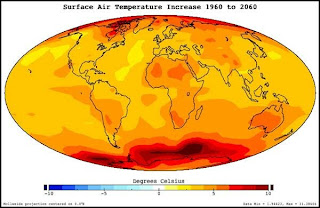
Democrats go ahead with climate change bill despite Republicans who demand more time and analysis, a poor model-based strategy dissected.
Recently, Democrats of the Environment and Public Works committee pushed through a climate bill without a single Republican present. Seven Republicans, also members of the committee, boycotted the meetings to discuss the climate bill, claiming insufficient time to study it and demanding that the Environmental Protection Agency conduct further economic analysis. These politicians are duplicating practices of inaction and misinformation. Demanding more studies at this point in time is counterproductive. Often the work of climate change policy requires estimations on the future. Short of a crystal ball, climatologists and economists assess rather conservatively the possibilities of the future. Unfortunately, policy-makers take for granted the fact that many models regarding the economics of global warming understate the adverse effects and costs of climate change.
Freeman & Guzman (2009) have outlined in greater detail six reasons that current economic models are overly optimistic. Firstly, the model's optimism about temperature rise, which corresponds to the fact that many politicians consider studies with the mid-range increase of 2-3C in mind (highly optimistic). Secondly, asymmetry around point estimates is a concern because it leaves room for misinterpretation. For example, as temperature rises its costs to mitigate see an increasing (near exponential) rate. So when considering mitigation costs between 2.5 degrees C and 5 degrees C, the costs to mitigate are not twice as much at 5C, but are about ten times more. Thirdly, failure to account for catastrophic events undermines the studies' comprehensiveness. Fourthly, failure to account for non-market costs, like human health, implies they are negligible to these studies (hard to imagine human health to cost zero dollars). Fifthly, studies' failure to account for cross-sectoral impacts paints an incomplete picture especially in an interconnected world where one housing industry calamity in the US can put the whole world in peril. Sixthly, long-term projections (growth and productivity), which are hardly considered in economic models, could double the estimates of harm in many prominent studies to date.
Scientific practices can also put into question optimistic climate scenarios. Many scientists have to be organized across continents and often agree on conservative estimates in order to agree at all. The IPCC FAR (2007) report required 2,800 reviewers to agree on its 2,946 pages. The report was condensed into a 58-page summary for policy makers, which leaves out many considerations that are important for the reader to understand the limitations of the findings. An example of admitted guesswork on the first page the Working Group I Policy-Maker Summary (in tiny font) states: "Note that a number of uncertainty ranges in the Working Group I TAR (Third Assessment Report) corresponded to 2 standard deviations (95%), often using expert judgement."
Models are helpful, but only if they are used correctly. In the end, Democrats are right to push forward a climate change bill without Republican support; Americans have had more than a decade of non-participation in climate change agreements. Now it is time to act.















0 comments:
Post a Comment